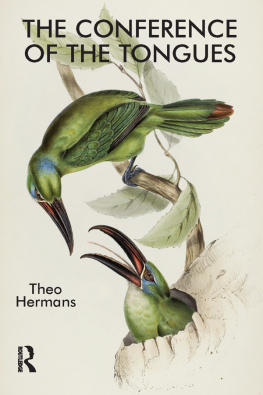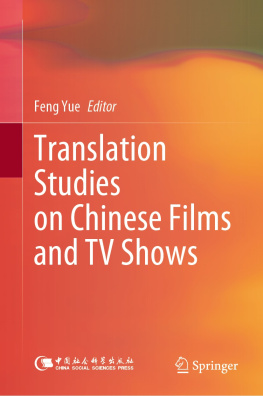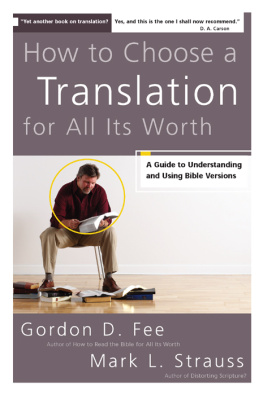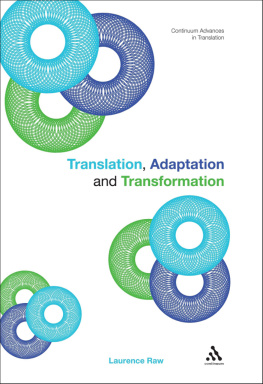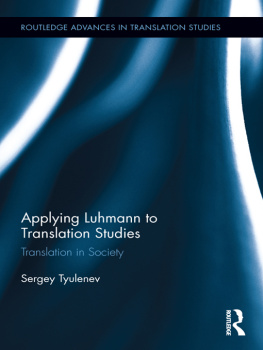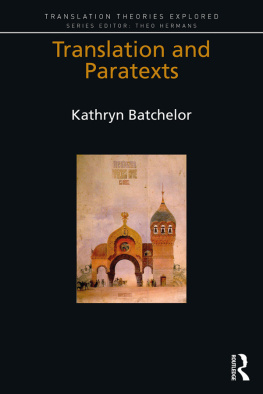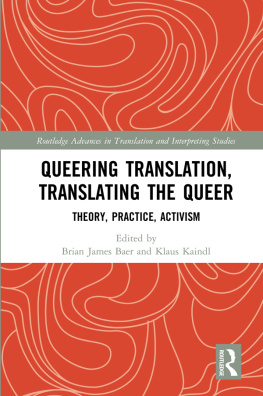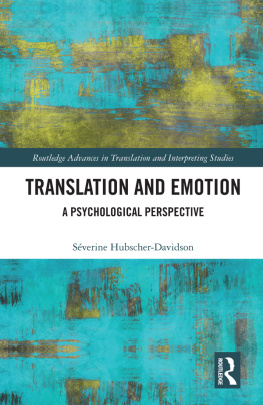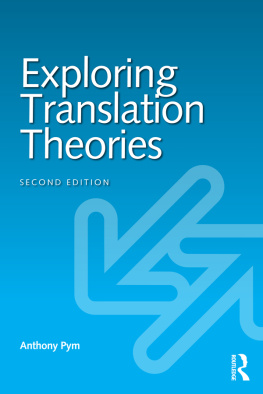The Conference of the Tongues
Theo Hermans
First published 2007 by St. Jerome Publishing
Published 2014 by Routledge
2 Park Square, Milton Park, Abingdon, Oxon OX14 4RN
711 Third Avenue, New York, NY 10017, USA
Routledge is an imprint of the Taylor & Francis Group, an informa business
Theo Hermans 2007
All rights reserved. No part of this book may be reprinted or reproduced or utilised in any form or by any electronic, mechanical, or other means, now known or hereafter invented, including photocopying and recording, or in any information storage or retrieval system, without permission in writing from the publishers.
Notices
Knowledge and best practice in this field are constantly changing. As new research and experience broaden our understanding, changes in research methods, professional practices, or medical treatment may become necessary.
Practitioners and researchers must always rely on their own experience and knowledge in evaluating and using any information, methods, compounds, or experiments described herein. In using such information or methods they should be mindful of their own safety and the safety of others, including parties for whom they have a professional responsibility.
To the fullest extent of the law, neither the Publisher nor the authors, contributors, or editors, assume any liability for any injury and/or damage to persons or property as a matter of products liability, negligence or otherwise, or from any use or operation of any methods, products, instructions, or ideas contained in the material herein.
ISBN 13: 978-1-905763-05-4 (pbk)
Typeset by
Delta Typesetters, Cairo, Egypt
British Library Cataloguing in Publication Data
A catalogue record of this book is available from the British Library
Library of Congress Cataloging-in-Publication Data
Hermans, Theo.
The conference of the tongues/ Theo Hermans.
p. cm.
Includes bibliographical references and index.
ISBN 978-1-905763-05-4 (pbk.: alk. paper)
1. Translating and interpreting. 2. Intertextuality. I. Title.
P306.H43 2007
418.02--dc22
2007024329
The Conference of the Tongues
THEO HERMANS
The Conference of the Tongues offers a series of startling reflections on fundamental questions of translation. It throws new light on familiar problems and opens up some radically different avenues of thought. It engages with value conflicts in translation and the social accountability of translators, and turns the old issue of equivalence inside out. Drawing on a wealth of contemporary and historical examples, the book teases out the translators subject-position in translations, makes notions of intertextuality and irony serviceable for translation studies, tries to think translation without calling on the idea of transformation, and uses a controversial sociological model to cast a cold eye on the entire world of translating.
This is a highly interdisciplinary study that remains aware of the importance of theoretical paradigms as it brings concepts from international law, social systems theory and even theology to bear on translation. Self-reference is a recurrent theme. The book invites us to read translations for what they can tell us about translating and about translators' own perceptions of their role. The argument throughout is for more self-reflexive translation studies.
Theo Hermans is Professor of Dutch and Comparative Literature and Director of the Centre for Intercultural Studies at University College London. A founding member of the Translation Research Summer School and the International Association for Translation and Intercultural Studies, he also edits the series Translation Theories Explored for St Jerome Publishing. He is the author of several books, including Translation in Systems and The Structure of Modernist Poetry, and editor of Translating Others, Crosscultural Transgressions and The Manipulation of Literature.
Contents
This is a book of translation theory. It has a double focus. It seeks to gain insight into translation by exploiting slightly unusual perspectives based on such things as the concept of authentication, the doctrine of the Real Presence and social systems theory. It also tries to tease out the way in which translators position themselves in their work and translations can be read as speaking about themselves.
engages with the cross-cultural study of translation and argues that the discipline needs to be thick to do the job well.
Very few of the ideas in this book are my own. Most have emerged, in one form or another, from reading, listening and talking, or even in the course of writing. All were initially aired in the form of lectures, seminars or papers delivered in a variety of locations and to different constituencies. I am grateful to all the audiences who endured half-baked expositions and helped to improve them with their critical responses. I want to thank in particular Martha Cheung, Alexandra Lianeri, Ubaldo Stecconi, Harish Trivedi and Maria Tymoczko for some inspiring conversations, and Robert Hodgson for checking the theology of .
The title of the book derives from the sixteenth-century scholar Pedro Simn Abril, who suggested, in the preface to a Latin and Spanish translation of Aesops fables, that learning a foreign language consisted less in piling up precepts than in the conference of the tongues (la conferencia de las lenguas) and imitation of good practice. At the time, lengua also meant interpreter.
Earlier versions of several chapters appeared in journals and conference proceedings. All have been reworked for the present book.
Acknowledgements
Thanks for permissions are due to the following:
UCL Librarys Special Collections, for permission to use the illustration from John Gould, A Monograph of the Ramphastidae: or Family of Toucans (London: Published by the author, 1834) for the books cover;
Statens Museum for Kunst in Copenhagen, for permission to reproduce the Board Partition with a Still Life of Two Dead Birds Hanging on a Wall and The Reverse of a Framed Painting by Cornelius Gijsbrechts;
Soprintendenza per il Patrimonio Storico Artistico ed Etnoantropologico delle Marche at the Palazzo Ducale, Urbino, for permission to reproduce Paolo Uccellos La Profanazione dell'Ostia;
The Random House Group Ltd, for permission to reproduce the map from the 1939 American translation of Adolf Hitlers Mein Kampf;
Bayerisches Staatsministerium der Finanzen, Munich, for permission to reproduce the cover of Adolf Hitlers Mein Kampf of 1925-6 and its Dutch translation of 1939.
Let us begin with a series of remarkable events. They unfolded in a place called Palmyra, in a far corner of New York State, just south of Lake Ontario. There, on the evening of 21 September 1823, a quiet Sunday, a young man named Joseph Smith, a farmhand then aged just eighteen, received an unexpected visitor. Joseph Smith had never met this person before. The stranger, a tall, bearded man, wore a long white robe, and his presence filled the room with light. Looking more closely, Joseph noticed that the visitors bare feet floated approximately twelve inches above the ground. Joseph had experienced the occasional vision before, but he had never seen this. The visitor was an angel. Speaking the universal angelic tongue, the angel introduced himself in English as Moroni and engaged the young farmhand in conversation. He informed him of the existence of an ancient book written on gold plates, and of seers prepared by God for its translation. The book, he declared, contained the fullness of the everlasting Gospel and an account of the former inhabitants of this continent (Hill 1977: 57). On departing, Moroni assured his host that he would return in due course to direct him to the gold plates, which he said were buried in a nearby hill.
Next page
